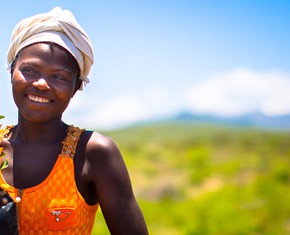The views expressed in our content reflect individual perspectives and do not represent the authoritative views of the Baha'i Faith.
Maturity is a high price to pay for growing up. – Tom Stoppard
What stage of life are you in?
Carl Jung–the great thinker, writer, psychiatrist and the founder of analytical psychology–categorized human life as having four definable stages of development:
Childhood, from birth to adolescence
Youth, from puberty to mid-life, when we reach independence and procreate
Middle life, from 35 or 40 until old age, when self-realization intensifies
Old age—a time for psychological rebirth, self-realization and preparing for the next life.
Jung firmly believed that self-realization—he also called it “individuation”–represents the highest level of human development in this plane of existence. It involves, he said, integrating the various parts and conflicts of our psyche into one unified, mature, whole individual. The Baha’i writings agree:
From the beginning to the end of his life man passes through certain periods or stages each of which is marked by certain conditions peculiar to itself. For instance during the period of childhood his conditions and requirements are characteristic of that degree of intelligence and capacity. After a time he enters the period of youth in which his former conditions and needs are superseded by new requirements applicable to the advance in his degree. His faculties of observation are broadened and deepened, his intelligent capacities are trained and awakened, the limitations and environment of childhood no longer restrict his energies and accomplishments. At last he passes out of the period of youth and enters the stage or station of maturity which necessitates another transformation and corresponding advance in his sphere of life-activity. New powers and perceptions clothe him, teaching and training commensurate with his progression occupy his mind, special bounties and bestowals descend in proportion to his increased capacities and his former period of youth and its conditions will no longer satisfy his matured view and vision. – Abdu’l-Baha, Foundations of World Unity, p. 9.
Each of these age-specific stages of development, Jung suggested, has several important roles to play in shaping our growth. In the childhood stage, we develop our consciousness and our emotions; start to learn logic and abstract thinking; and begin to develop our egos.
 In the youth phase of human development, our consciousness grows and expands; we enter the world at large as adults; our sexuality matures; and we naturally try to gain independence, educate ourselves, enter into a productive work life, find a mate and, often, raise a family. Also, most people understand, at this stage, that their increasing levels of independence and the responsibility that goes along with it mean the carefree days of childhood have passed, never to return.
In the youth phase of human development, our consciousness grows and expands; we enter the world at large as adults; our sexuality matures; and we naturally try to gain independence, educate ourselves, enter into a productive work life, find a mate and, often, raise a family. Also, most people understand, at this stage, that their increasing levels of independence and the responsibility that goes along with it mean the carefree days of childhood have passed, never to return.
In middle life, Jung said, healthy adults gradually understand that their bodies won’t live forever—which creates inner tension for every person. Here we all face the biggest life question: what happens when I die? At this stage in our development, we often tend to increasingly look inwardly for answers, and we begin the process Jung called self-realization—a psychological rebirth that integrates the various disparate parts of our psyches into a unified, mature person.
In this middle stage—which he famously called “the second half of life”—Jung said that people naturally seek a “religious outlook,” and start to seriously consider the real, lasting meaning of their lives:
Midlife is the time to let go of an over-dominant ego and to contemplate the deeper significance of human existence.
Among all my patients in the second half of life—that is to say, over thirty-five—there has not been one whose problem in the last resort was not that of finding a religious outlook on life. It is safe to say that every one of them fell ill because he had lost what the living religions of every age have given their followers, and none of them has been really healed who did not regain his religious outlook.
Those who fail to enter and grapple with this important developmental stage, Jung said, who desperately attempt to cling to their youth, will try to deny the inevitable reality of aging and death, and therefore miss out on the process of self-realization:
Shrinking away from death is something unhealthy and abnormal which robs the second half of life of its purpose.
Unlike many of his peers in the emerging field of psychology at the time, Jung saw death as the ultimate goal of life—a necessary, unavoidable and spiritually healthy transition we should all look forward to and welcome. By realizing this fact, he said, people need not face death with fear, but with hope for rebirth into an eternal existence. Psychologically well-adjusted adults, he concluded, would welcome death, seeing it as heralding a sense of continuity for everyone. Jung’s conclusion about our continuous, everlasting life agrees with the Baha’i view:
A friend asked: “How should one look forward to death?” Abdu’l-Baha answered: “How does one look forward to the goal of any journey? With hope and with expectation. It is even so with the end of this earthly journey.” – Abdu’l-Baha in London, pp. 95-96.
Jung’s work provided humanity with many of the profound insights modern psychology relies on today; but strangely his emphasis on religion, the ultimate meaning of life and the open embrace of death, which resonates so well with the Baha’i teachings, has often been overlooked.
Let’s rectify that in this series of BahaiTeachings essays, by considering Jung’s discoveries about the later stages of life, and learning what those “second-half” stages mean for our individual lives. We’ll explore the importance of the middle and post-middle ages, and try to understand the goals inherent in them and the challenges they offer us. Most importantly, we’ll examine what has to happen in those critical phases of our lives in order for us to spiritually and psychologically advance, and translate that stage-specific advice into practical deeds we can all do to make sure our development moves forward toward its destiny.
















Comments
Sign in or create an account
Continue with Googleor